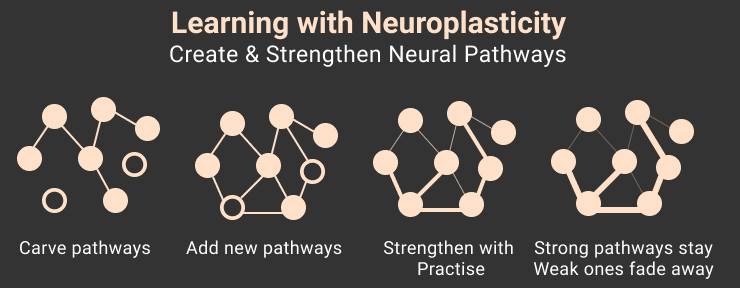My last post outlined how changing lifestyle habits creates new neural pathways. These pathways are like roads in our brains, and the more we use them, the stronger they become. In this post, I will share with you How to Change Habits by Creating New Neural Pathways.
By creating new neural pathways, I established a habit causing conflict in my current health situation. Nerve compression in my neck has caused the loss of fine motor skills, loss of strength in my hands and arm and a problem with my eyesight, making simple tasks like writing or even holding a cup of coffee difficult. Similarly, nerve compression in my lower back has caused muscle atrophy in my legs and nerve pain that is made bearable with painkillers.
The habit of waking at 4:30 in the morning and walking a minimum of 5,000 steps before breakfast had become so entrenched in my daily routine that I was able to drop 40 kilograms (88 pounds), putting my Type-2 diabetes into remission, allowing my kidneys to recover from stage 3B kidney failure and has allowed me to reduce 16 prescription medications down to just six. This transformation brought relief and hope that I never thought possible.
My old neural pathways remain, and it is a daily fight not to allow them to dominate my habits. I understand the struggle and determination to resist these old habits. After seven weeks of medical tests, including ultrasound, x-ray, CT Scan and finally an MRI, I am at a point where neurosurgery may be my last option to be able to rise again at 4:30 in the morning and allow my dominant neural pathway to lead me back to good health.

Changing a Habit
Changing a habit and creating new neural pathways is more complex and variable than commonly believed. Contrary to the popular notion that it takes 21 days to form a new habit, research indicates that the timeline for habit formation can vary significantly from person to person and depends on the habit being formed.
Empower yourself with the knowledge that you can shape your habits. A study published in the European Journal of Social Psychology found that, on average, it takes 66 days for a new behaviour to become automatic. However, this is just an average; the actual time can range from 18 to 254 days. This wide range reflects the diversity of habits that people may attempt to form and the individual differences in how quickly people adapt to new behaviours.
Habit formation involves creating and strengthening new neural pathways in the brain. During the early stages of forming a habit, the decision-making parts of the brain, specifically the prefrontal cortex, are highly active. As the new routine is repeated, brain circuits or neural networks are activated and strengthened through neuroplasticity.
Neuroplasticity, the brain’s remarkable ability to change and adapt due to experience, is a fascinating aspect of habit formation. Each time you perform a new action, the neural networks associated with that behaviour become stronger and more efficient. Over time, fewer cues or triggers are needed to activate the same network of brain cells, making the behaviour more automatic.
The time required to rewire the brain and form a new habit can vary, but it generally takes three to nine months to create and integrate new neurons. This process involves isolating specific components of the new behaviour, incorporating them, and eventually being able to improvise or perform the behaviour more naturally.
Several factors influence the speed of habit formation, including the complexity of the behaviour, the individual’s motivation to change, and the frequency of practice. Habits perceived as pleasurable at the moment are often easier to form, while those that are less immediately rewarding but have long-term benefits may be more challenging to establish.
Recent research from the University of South Australia further challenges the 21-day myth, finding that new habits can begin forming within about two months (with a median of 59–66 days) but can take up to 335 days to be fully established. This study emphasizes the importance of persistence and patience when forming new habits, especially those related to health and well-being. Remember, it’s a journey, not a race.
From a neurobiological perspective, habit formation is not a simple process; it involves multiple changes in neural activity across various brain regions. This complexity suggests that habits are shaped by numerous alterations in the brain, which may explain why some habits are more difficult to form or break than others.
Focusing on small, incremental changes that can be sustained over time is essential when attempting to form a new habit. Strategies such as setting specific times for the new behaviour, incorporating it into a daily routine, and finding ways to make the habit enjoyable can all contribute to successful habit formation.
Consistency and repetition are the keys to changing habits and creating new neural pathways. While the exact timeline may vary, understanding that habit formation is a gradual process can help individuals maintain motivation and persistence to adopt new behaviours. People can approach habit formation with a more realistic and sustainable mindset by focusing on the process rather than a fixed timeline.
Tomorrow, I will share with you How do we Change Detrimental Habits.
